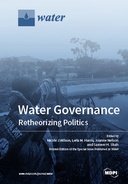Explore

Water Governance: Retheorizing Politics
0 Ungluers have
Faved this Work
Login to Fave
This republished Special Issue highlights recent and emergent concepts and approaches to water governance that re-centers the political in relation to water-related decision making, use, and management. To do so at once is to focus on diverse ontologies, meanings and values of water, and related contestations regarding its use, or its importance for livelihoods, identity, or place-making. Building on insights from science and technology studies, feminist, and postcolonial approaches, we engage broadly with the ways that water-related decision making is often depoliticized and evacuated of political content or meaning—and to what effect. Key themes that emerged from the contributions include the politics of water infrastructure and insecurity; participatory politics and multi-scalar governance dynamics; politics related to emergent technologies of water (bottled or packaged water, and water desalination); and Indigenous water governance.
This book is included in DOAB.
Why read this book? Have your say.
You must be logged in to comment.
Rights Information
Are you the author or publisher of this work? If so, you can claim it as yours by registering as an Unglue.it rights holder.Downloads
This work has been downloaded 417 times via unglue.it ebook links.
- 65 - pdf (CC BY-NC-ND) at Unglue.it.
Keywords
- Africa
- Anishinabek
- Belo Monte
- Bolivia
- bottled water
- Brazil
- Cairo
- Canada
- Central Asia
- Chile
- Cochabamba
- Colombia
- Colonization
- community-based research
- Dams
- Decentralization
- decision-making processes
- depoliticization
- desalination
- drinking water
- Egypt
- Energy policy
- Environmental assessment
- environmental flows
- Environmental justice
- First Nations
- FPIC
- free
- giikendaaswin
- governance
- governmentalities
- Groundwater
- hydropower
- hydrosocial
- Indigenous knowledge
- Indigenous water
- Indigenous water governance
- Indonesia
- Informality
- Infrastructure
- integrated water resource management (IWRM)
- International development
- Irrigation
- Jakarta
- kitchen gardens
- Latin America
- Law
- legal geography
- Lesotho
- Mining
- narrative ethics
- national interest
- nibi (water)
- OECD
- orientation knowledge
- packaged drinking water (PDW)
- Participation
- participatory development
- PES
- Planning
- Political ecology
- political ontology
- Politics
- Power
- practices of mediation
- prior and informed consent
- re-theorizing
- religious difference
- remunicipalization
- repoliticization
- Risk
- scale politics
- Settler Colonialism
- Social control
- spatio-temporal
- Tajikistan
- thema EDItEUR::Q Philosophy and Religion::QD Philosophy
- Two-Eyed Seeing
- UN Declaration on the Rights of Indigenous Peoples
- UNDRIP
- urban India
- urban water
- urban water infrastructure
- Water
- water colonialism
- water ethics
- Water Governance
- water insecurity
- water justice
- water management
- Water politics
- Water quality
- Water rights
- Water security
- Water Users’ Associations
- WEF Nexus
- Women
- Yukon
Links
DOI: 10.3390/books978-3-03921-561-4Editions


